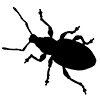Planning
The planning for this shot was more involved than the image itself. I found this willow warblers nest in the tall grass in my garden. On my first sighting it appeared as if the bird had fallen out of the tree to land in the grass. It was only as I walked over to inspect did I see this small bird peering out from it's nest. The area around the bird had recently been mown so that now it was resting inside a small island of grass. It was only through sheer luck that the nest and it’s small contents had not been destroyed.
Warbler returning with food, perches atop decoy camera
From that first sighting I knew I had to get a picture of the adult bird on the nest. The challenge was getting a camera in close enough without disturbing the parent birds. To do that I created a decoy camera. From layers of polystyrene I carved a replica 5D with 24mm lens. This I painted black and affixed a shiny plastic to the front to replicate the shiny glass of the lens.
Willow warbler sitting on very young chicks
I then placed this decoy camera several feet from the nest site. Each day when the bird was away from the nest I would inch the decoy a few inches closer. After several weeks I had the camera sufficiently close and the adult bird would happily perch atop the decoy before entering the nest.
Equipment
Canon 5D MKii, Canon 24mm tse, usb extension cable.
The decoy camera sitting next to the real thing
The shoot
This shoot was very similar to photographing the blue tits at the nest box. I had my camera tethered to a laptop via a usb extension cable. I pre focused the lens and when the parent bird left the nest I quickly replaced my decoy camera with the real thing.
Cropped in photograph showing warbler chicks before their eyes have opened
Before the adult returned I activated live view using the eos utility. This not only let me peer into the nest but also lifted the mirror out of the way, significantly reducing camera noise. The disadvantage was that it reduced battery life and caused a lag in the shutter release.





